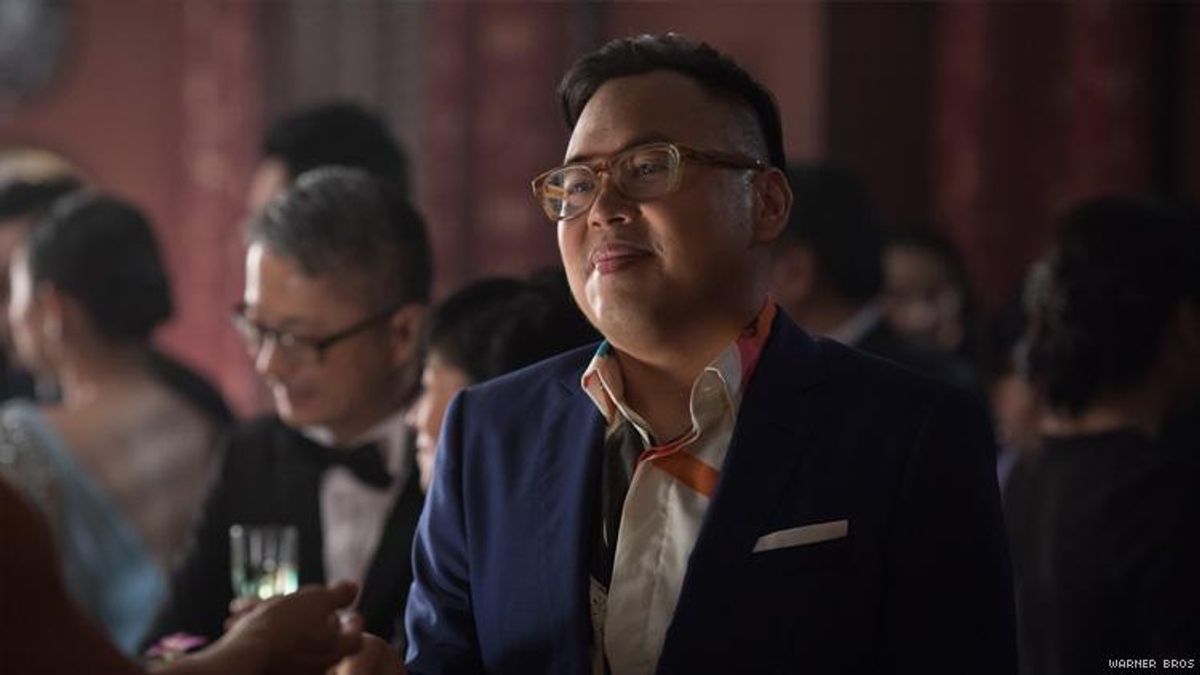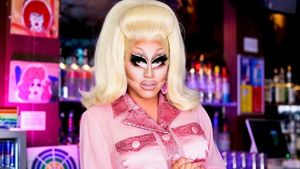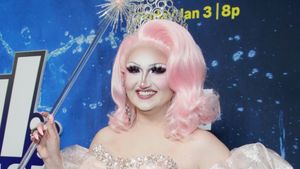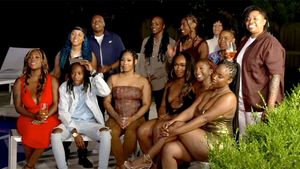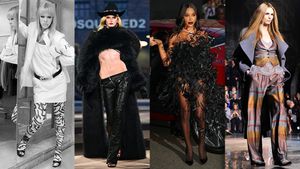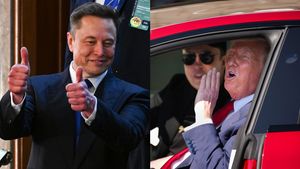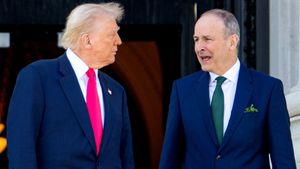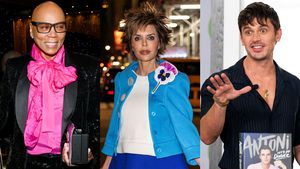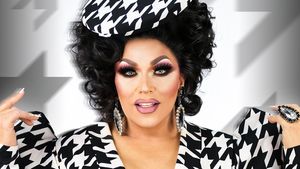Nico Santos rose to national fame in the role of Mateo Liwanag on the popular NBC comedy series Superstore, which premiered in 2015. And now Santos can add international movie star to his resume. He portrays Oliver, a gay character, in one of the summer's most anticipated Hollywood films, Crazy Rich Asians.
For Santos, it has been a "surreal" experience to have these kinds of opportunities in the entertainment industry as a gay and Filipino-American actor.
"When I got that role of Mateo in Superstore, it was such a huge victory for me, professionally and personally," Mateo told The Advocate in a recent phone interview. "I never thought an opportunity like Crazy Rich Asians would ever come my way."
"The fact that I'm able to portray these complex, fully realized, queer Asian characters? I never thought it would be in this position," Santos said. "You just never see those types of characters and that type of representation."
Santos has reason to be in disbelief. Hollywood still struggles with its representation of Asian and queer characters. And those that stand at this intersection are nonexistent in movies made by major studios. Crazy Rich Asians is the first Hollywood film with an all-Asian cast since the release of The Joy Luck Club, and that was 25 years ago. Moreover, a recent report from GLAAD showed record lows of LGBTQ representation in 2017 films -- and yes, zero queer Asian characters.
So for Santos to watch himself portray the larger-than-life Oliver in Crazy Rich Asians? "It's mind-blowing to me."
"I always thought that when I got into this business that I was going to have to downplay my Asianness and downplay my queerness, which is not an easy thing for me to do," Santos said. "But now, I feel really honored that I get to play these characters."
Why has it taken so long for Hollywood to green-light a film like Crazy Rich Asians -- and a queer Asian character like Oliver? "There's still not a lot of diversity behind the camera," said Santos, including the "gatekeepers of the industry" who for years operated under the assumption that audiences would only buy tickets to movies about "two straight blond people with blue eyes."
But recent events have proved this assumption wrong. The success of films that center on historically marginalized characters like Black Panther and Love, Simon has opened the eyes of many executives to the economic opportunities in diversity. Clearly, there is a market.
"Audiences are yearning for stories from people of color, from LGBTQ people, and these films make money," Santos said. "The landscape has changed. People want to see themselves reflected on-screen -- on the big screen and the small screen. It's just our time."
Santos's priorities as an actor have changed in response to this changing landscape. He is no longer trying to hide his identities; he is embracing them.
"I have no interest in playing straight roles, honestly. I just want to play interesting queer Asian roles or even roles that come across my desk that aren't meant to be queer or Asian," Santos said. "I'm interested to see how I can portray them through that lens, because it's important for representation like mine to exist now."
A reason for this, in part, is the fan response Santos has been receiving from people who are queer and Asian, who had never seen themselves reflected before.
"I'd never really realized how important [representation] is until I started Superstore and this movie, and all the messages I've been getting from audiences out there and how much it means to them," he said. "Seeing yourself on-screen, it matters. People are so moved by it."
"If I am able to build a career playing these great queer Asian roles like that, that's the one I want to do now. That's really the one I'm focused on," he added.

Santos is ambitious in his goals. The actor wants to show the "huge spectrum of our community out there" to expand on Crazy Rich Asians' portrayal of Asians as "complex, three-dimensional characters with wants, needs, and desires" instead of stereotypes. He envisions a version of the film that centers on a queer love story, or even an Asian version of Love, Simon, a gay teen rom-com that received a strong box office as well as some criticism for its white, heteronormative lead portrayed by a straight actor.
The reality is that many queer roles in Hollywood still go to straight actors, including the casting of Jack Whitehall as Disney's first clearly gay character in Jungle Cruise. While Santos would not criticize an ally for playing a queer part, he does recognize how important it is that he, as a queer man of color, has portrayed two prominent queer characters. "I don't take it lightly that I have the privilege of being gay [and] portraying a gay character, because we rarely get that opportunity, and I feel really fortunate to be a part of that," he said.
In Crazy Rich Asians, Santos's character, Oliver, is one of the less affluent cousins of Nick Young, the incredibly wealthy and eligible love interest of Rachel Chu (Constance Wu). On the surface, the character of Oliver is a textbook Magical Gay, who provides guidance and a makeover to Rachel to help her impress these relatives.
Yet Santos defended the dimensions of his character. He described Oliver as "the rainbow sheep" of the family who is fighting for acceptance in the world. To fully realize him, Santos worked with a dialect coach in order to have a voice that was "poshier" and "more pretentious" than those of the other members of his family, in part due to his own insecurities. "I feel like he was protecting himself by putting on all these airs," Santos said.
And Oliver's significance cannot be underplayed, particularly as he is bringing queer representation to an international Asian audience. In Singapore, where Crazy Rich Asians is set, gay sex is technically illegal and same-sex unions are not recognized by law. Moreover, the majority of characters in the film are ethnic Chinese. It is possible that China, due to its censorship laws, might cut a gay character like Oliver, as it threatened to do to Beauty and the Beast over its "gay moment."
There is no release date yet for the world's second-largest box office. But Santos hopes Oliver makes the cut in any country with antigay censorship. "The movie is not the same without Oliver. This film is just not complete without him. And it's important to me that he is a part of it," said Santos, who believes Oliver can help humanize queer people for an international audience.
"We know what it's like to be an outsider in our own family," said Santos. "When we're first coming out, we all have to make that decision in our heads, of [being] willing to lose our own family to be able to live our true authentic selves. And that is not an easy decision to make."
"I hope people see, when they watch the film, the fact that Oliver is embraced by his family, that he is a part of this family in a major way, that it's possible for us to be loved by our families," he added. "I know that's not the case for everybody out there. We hear horrible stories all the time about people being kicked out or disowned by their own families. But when that happens, the good thing about being queer is that you get to decide who your family is. That's what I love about it."

Beyond Oliver, however, there is much that LGBTQ audience members can relate to in Crazy Rich Asians, which at its heart is about a person hoping to find acceptance from the family of the person they love. Santos believes this message can resonate with people from all backgrounds.
"These themes are universal," he said. "You don't have to be just queer or just straight or just Asian to relate to those things. These are things that all humans go through: wanting to find love, wanting to keep love, not being accepted, the fear of being rejected by their own family. Everybody goes through that. I hope that people do see that in the movie and do realize exactly that -- that we are so much more alike than we are different."
As much as Crazy Rich Asians has been hailed for its representation, it has also received criticism for different issues, such as the casting of its biracial male lead (Henry Golding) or the lack of diversity of Asian characters.
Santos -- who as a Filipino-American actor said he initially feared a backlash after his casting as a Singaporean character -- advised critics to look at "the big picture."
"This is our first chance in Hollywood to really change the game," he said. "I feel like our chances and the opportunity to tell those other stories are going to come. But ultimately, this movie, it's great for everybody. Rising tides lift all ships, right?"
"It's not going to make everybody happy because it doesn't have the full gamut of representation," said Santos, but "this movie's going to open up the floodgates for other Asian stories to be told ... the Filipino story and the Korean story and the Japanese story and the Malaysian story. There's so much to draw from, and this is really just the beginning. I think change takes time. Beyonce wasn't built in a day."
In the meantime, Santos is taking a moment to appreciate what he has achieved.
"The fact that I'm changing lives by representing the queer community and Asian people through my comedy and through something that I love to do? It just makes my heart swell."
Crazy Rich Asians is now out in theaters. Watch the trailer below.
